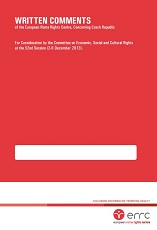WRITTEN COMMENTS of the European Roma Rights Centre and Center for Civil and Human Rights, Concerning Slovakia (For Consideration by the Committee on the Rights of the Child at the 72nd
Pre-Sessional Working Group 5 - 9 October 2015)
WRITTEN COMMENTS of the European Roma Rights Centre and Center for Civil and Human Rights, Concerning Slovakia (For Consideration by the Committee on the Rights of the Child at the 72nd
Pre-Sessional Working Group 5 - 9 October 2015)
Author(s): Author Not Specified
Subject(s): Gender Studies, Education, International Law, Human Rights and Humanitarian Law, Security and defense, Welfare systems, Social differentiation, Health and medicine and law, Ethnic Minorities Studies
Published by: European Roma Rights Center
Keywords: Slovakia; human rights; Roma; children; education; discrimination; health care; segregation; Romani girls; sterilisation; police treatment; harassment;
Summary/Abstract: The Center for Civil and Human Rights (Poradňa pre občianske a ľudské práva, hereinafter also referred to as „Poradňa“) and the European Roma Rights Centre (hereinafter also referred to as “ERRC”) hereby jointly submit this report to the United Nations Committee on the Rights of the Child (hereinafter also referred to as “Committee”) for the consideration to the 72nd Pre-Sessional Working Group (05 Oct 2015 - 09 Oct 2015). The report focuses on issues disproportionately impacting Romani children in Slovakia including: - discriminatory legislation; - discrimination of Romani children in education; - sterilization of Romani girls without parental and informed consent; - segregation of Romani patients, including children, in hospitals; - adequate standard of living; - police ill-treatment and harassment; - Romani children in institutional care. In its 2007 Concluding observations (CRC/C/SVK/CO/2) , the Committee touched upon most of the abovementioned issues. The submitting organisations are concerned that Slovakia has done little to address the Committee’s concerns and recommendations and that progress in complying with the Convention on the Rights of the Child is slow and insufficient. Altogether more than 40 per cent of Roma in Slovakia live in segregated settings either outside of municipalities or on their peripheries. Many of those families live in substandard living conditions facing the threat of eviction. Residential segregation usually affects educational attainment and future employment possibilities. Discrimination against Romani children is twofold in education: they are overrepresented in special schools and classes for children with mild mental disabilities and also segregated in separate classrooms and schools within mainstream education. Romani children are also significantly overrepresented in State childcare institutions and disproportionally affected by the legislative framework regulating the social security system. In recent years, the submitting organisations have recorded a growing number of verbal and physically violent attacks and incidents of harassment committed by police against Roma, including minors, which have not been investigated effectively. Submitting organisations have also advocated for effective investigation of the practice of sterilization of Romani women and girls without parental and informed consent in Slovakia and adequate compensation for affected women and girls, which the Slovak Government fails to conduct.
Series: Papers submitted to OHCR and related Commissions
- Page Count: 15
- Publication Year: 2015
- Language: English
- Content File-PDF
- Introduction

